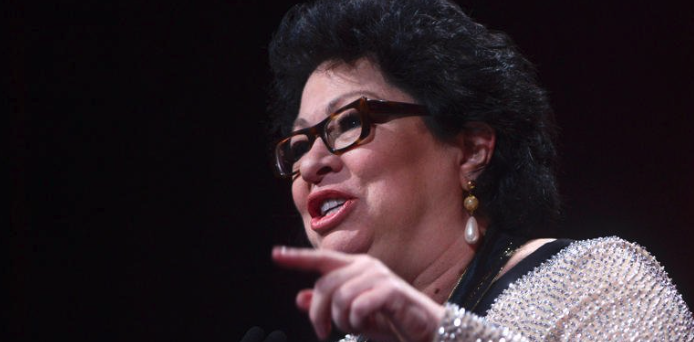So says Justice Sotomayor today. I had prepared a nice post about another important LGBTQI+ civil rights case here in Washington, known as the Arlene’s Flowers case. In that case, a flower shop refused to provide floral services to a gay couple for their wedding because the shop’s proprietor believed marriage could only be between a man and a woman. The couple and the Attorney General of the State of Washington successfully sued the flower shop for discrimination on the basis of sexual orientation, which is prohibited by the Washington Law Against Discrimination (WLAD). The case went all the way to the US Supreme Court and twice to the Washington Supreme Court, which held that Arlene’s Flowers violated WLAD and that the First Amendment did not provide an exception to the state law against discrimination. Hooray for the legal protections provided by state law!
And then this morning, on the last day of Pride month, the US Supreme Court dealt a serious blow to the queer community’s civil rights. The Court decided, by a 6-3 vote, that Colorado’s antidiscrimination law, which prohibited discrimination on the basis of sexual orientation, violated the First Amendment when it required a web designer to design wedding websites for gay couples when her sincerely held religious belief was that marriage could only be between a man and a woman. In other words, the Court has now carved out a First Amendment exception to discriminate against the queer community in certain cases. Justice Sotomayor’s dissent put it this way: “Today, the Court, for the first time in its history, grants a business open to the public a constitutional right to refuse to serve members of a protected class.”
The Court’s majority focused on this case as one of “government compelled speech,” where the web designer would be required by state law to design websites for same-sex couples, creating the impression that the designer supports and celebrates gay marriage. The Colorado law requires more than just equal accommodation—like hotels and restaurants that must serve all comers. It requires the person to create expressive designs that they do not want to create because they don’t agree with the message.
The dissent argues that the case isn’t one of speech, it’s about conduct and the act of discrimination which is not protected by the First Amendment:
The business argues, and a majority of the Court agrees, that because the business offers services that are customized and expressive, the Free Speech Clause of the First Amendment shields the business from a generally applicable law that prohibits discrimination in the sale of publicly available goods and services. That is wrong. Profoundly wrong. As I will explain, the law in question targets conduct, not speech, for regulation, and the act of discrimination has never constituted protected expression under the First Amendment.
Dissent, at 2.
Justice Sotomayor explains that the Colorado law does not dictate what speech can or cannot be included on the website. So far example, the web designer could “offer only wedding websites with biblical quotations describing marriage as between one man and one woman,” so long as the company offers “its services without regard to customers’ protected characteristics.” Dissent, at 28.
The problem with the logic of the majority opinion, of course, is that it becomes a license to discriminate on the basis of someone’s extreme religious views about the queer community, or women, or Black people, or Muslims, or Jews, or interracial marriage, etc. so long as that person has an argument that doing otherwise would force them to express agreement with something they don’t agree. For example, Justice Sotomayor explains the Court’s majority opinion gives license to website designers to discriminate against interracial couples because “[h]ow quickly we forget that opposition to interracial marriage was often because “‘Almighty God . . . did not intend for the races to mix.’” Dissent, at 37. Or a stationary store “could refuse to sell a birth announcement for a disabled couple because she opposes their having a child.” Id. Or a retail store “could reserve its family portrait services for ‘traditional’ families. And so on.” Id.
This case guts the WLAD and protections upheld in Arlene’s Flowers. Under today’s US Supreme Court’s decision, the State of Washington now has no recourse when a service provider cites the intention of not serving the queer community because it would be forced to express support for them. As the dissent points out, that view is the opposite of a free and equal society. It is a sad day, indeed.
Photo credit: Supreme Court Justice Sonia Sotomayor. Leigh Vogel/Getty Images
